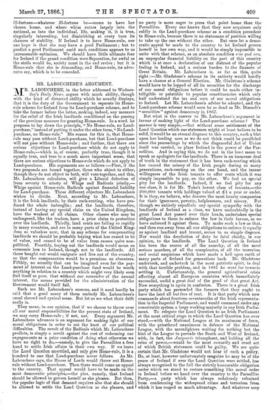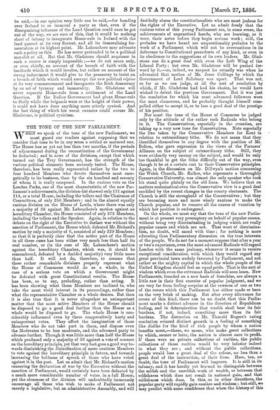MR. LABOUCHERE'S ARGUMENT.
R day' L A Bs DO Ua iClyH E eRtvE. , ai nr ut he es l we t et hr a dude': s saed hi tt toy W,t eh do nu egsh-
with the kind of distorted ability which he usually displays, that it is the duty of the Government to separate its Home- rule scheme for Ireland from its Land-purchase scheme, and to take the former before the latter, making, indeed, any measure for the relief of the Irish landlords conditional on the passing of the previous measure for granting Home-rule. In a word, he proposes to lay down the principle, " No Home-rule, no Land- purchase," instead of putting it under the other form," No Land- purchase, no Home-rule." His reason for this is, that Home- rule may pass without Land-purchase, but that Land-purchase will not pass without Home-rule ; and further, that there are serious objections to Land-purchase which do not apply to Home-rule,—which is, of course, perfectly true, though it is equally true, and true in a much more important sense, that there are serious objections to Home-rule which do not apply to Land-purchase. His arguments are as follows :—First, if the two proposals are bound together, those who object to either, though they do not object to both, will vote together, and this, Mr. Labouchere calculates, will give a Liberal defection of from seventy to ninety of Whigs and Radicals jointly,— Whigs against Home-rule, Radicals against financial liability for Land-purchase. These different objectors Mr. Labouchere wishes to divide. Next, according to Mr. Labouchere, it is the Irish landlords, by their rack-renting, who have pro- duced the whole imbroglio ; and the landlords, therefore, instead of having any special claim on the United Kingdom, have the weakest of all claims. Other classes who may be endangered, like the traders, have a prior claim to protection over the landlords. Thirdly, land rents are falling so rapidly in many countries, and are in many parts of the United King- dom so valueless now, that in any scheme for compensating landlords we should be probably buying what has ceased to be of value, and ceased to be of value from causes quite non- political. Fourthly, buying out the landlords would mean an economic loss to Ireland, though not to the landlords. All those bought out would emigrate and live out of the country, so that the compensation would be a premium on absentees. Fifthly, no security that can be imagined even for the pay- ment of interest on the Land-purchase fund would be worth anything in relation to a country which might very likely soon find itself so poor, that without our surrender of the annual interest, the means provided for the administration of the Government would itself fail.
Such are Mr. Labouchere's reasons, and it need hardly be said that a good many of them embody Mr. Labouchere's usual shrewd and cynical sense. But let us see what their drift really is.
They mean, in our opinion, that if we choose to throw over all our moral responsibilities for the present state of Ireland, we may carry Home-rule ; if not, not. Every argument Mr. Labouchere advances is an argument for making light of our moral obligations in order to cut the knot of our political difficulties. The revolt of the Radicals which Mr. Labouchere predicts, is simply a revolt against the cost of redeeming our engagements as a prior condition of doing what otherwise we have no right to do,—namely, to give the Parnellites a free hand to settle Irish affairs in their own way. If we leave the Land Question unsettled, and only give Home-rule, it is a hundred to one that Land-purchase never follows. As Mr. Labouchere says, the House of Lords would throw out Home- rule without Land-purchase. Then there would come an appeal to the country. That appeal would have to be made on the most democratic principles,—the plea, namely, that Ireland should be allowed to govern herself as she pleases. But then, the popular logic of that demand requires also that she should be allowed to settle the Land Question as she pleases, and
no party is more eager to press that point home than the Parnellites. Every one knows that they now acquiesce only coldly in the Land-purchase scheme as a condition precedent to Home-rule, because there is no statesman of position willing to take up the one without the other. But once let a demo- cratic appeal be made to the country to let Ireland govern herself in her own way, and it would be simply impossible to unite with that scheme, as an absolute condition s'ne gild non, an unpopular financial liability on the part of this country which is at once a declaration of our distrust of the popular feeling in Ireland, and a serious burden to the finances of Great Britain. Mr. Labouchere is, so far as this, quite right :—Mr. Gladstone's scheme in its entirety would hardly have a chance at a General Election. Mr. Gladstone's scheme would have to be lopped of all its securities for the discharge of our moral obligations before it could be made either in- telligible or palatable to popular constituencies which only half understand the ins and outs of our moral obligations to Ireland. Let Mr. Labouchere's advice be adopted, and the Land-purchase scheme would soon be as dead as Mr. Disraeli's " securities " against democracy in 1867.
But what is the answer to Mr. Labouchere's argument in favour of making light of the Land-purchase scheme ? The answer is very simple,—that without some settlement of the Land Question which our statesmen might at least believe to be solid, it would be an eternal disgrace to this country, such a blot upon her leading men as we do not think could be paralleled since the proceedings by which the disgraceful Act of Union itself was carried, to place Ireland in the power of the Par- nellites. And in saying this, we do not in the least mean to speak as apologists for the landlords. There is an immense deal of truth in the statement that it has been rack-renting which has caused the misery of the Irish people during so many generations, rack-renting on the one hand, and the insane willingness of the Irish tenants to offer rents which it was simply impossible to pay, on the other. We feel no special pity for the landlords. Indeed, if we feel pity for any one class, it is for Mr. Tuke's lowest class of tenants,—the 200,000 tenants with holdings valued at £4 a year or under. It is they, we believe, who deserve the most hearty compassion for their ignorance, poverty, helplessness, and misery. But though we entirely repudiate any special sympathy with the landlords of Ireland as a class, we have undoubtedly in the great Land Act passed over their heads, undertaken special obligations to them to enforce the law in their favour, as we have enforced it against them. To make such a law as that, and then run away from all our obligations to enforce it equally as against landlord and tenant, seems to us simple disgrace. Nor would the dereliction of duty be fatal chiefly, in our opinion, to the landlords. The Land Question in Ireland has been the source of all the anarchy, of all the most serious murders, of all the conspiracies, of all the terrorism and social suspicions which have made a hell upon earth of many parts of Ireland for generations back. Mr. Gladstone undertook, and undertook in the most patriotic spirit, to deal with that terrible problem, and in 1881 he went far towards settling it. Unfortunately, the general agricultural crisis affecting almost all European countries which immediately succeeded, undid a great deal of the good of that great Act. Now everything is again in confusion. There is a great Irish party which has persuaded the farmers that they ought to have the land all but free of rent. It is that party which now commands about fourteen-seventeenths of the Irish representa- tion in the Imperial Parliament, and would command under any conceivable system a large working majority in any Irish Parlia- ment. To relegate the Land Question to an Irish Parliament at the most critical stage in which the Land Question has ever stood,—with the National League at its maximum of force, with the priesthood unanimous in defence of the National League, with the moonlighters waiting for nothing but the hint of the League to pervade the South and West of Ireland, with, in fact, the Jacquerie triumphant, and holding all the reins of power,—would be the most cowardly and cruel act
of which British statesmen could be guilty. We are quite certain that Mr. Gladstone would not hear of such a policy. He, at least, however unfortunately sanguine he may be of the
peace of Ireland if ever the Land Question were settled, has always recognised to the full the strictly honourable obligation under which we stand to restore something like moral order in Ireland before we hand over the country to the Parnellite Party,—a party which has always sedulously refrained from condemning the widespread crime and terrorism from which it has reaped so much advantage. And whatever may be said,—in our opinion very little can be said,—for handing over Ireland to so immoral a party as that, even if the disorganising influence of the Land Question could once be got out of the way, we are sure of this, that it would be nothing short of infamy to inaugurate Home-rule in Ireland with the land quarrel at its very fiercest, and all its demoralising fer- mentation at its highest point. Mr. Lahouchere may advocate such a policy as this. He has never pretended to be a political moralist at all. But that Mr. Gladstone should acquiesce in such a course is simply impossible.;—we do not mean only, or even chiefly, on account of the breach of faith with the landlords which it would involve, but rather on account of the strong inducement it would give to the peasantry to insist on a breach of faith which would corrupt the new political regime at its very commencement and inaugurate the Irish democracy by an act of tyranny and immorality. Mr. Gladstone will never separate Home-rule from a settlement of the Land Question. If the Italian Government had given Home-rule to Sicily while the brigands were at the height of their power, it could not have done anything more utterly cynical. And the last thing of which his worst enemies could accuse Mr. Gladstone, is political cynicism.



































 Previous page
Previous page